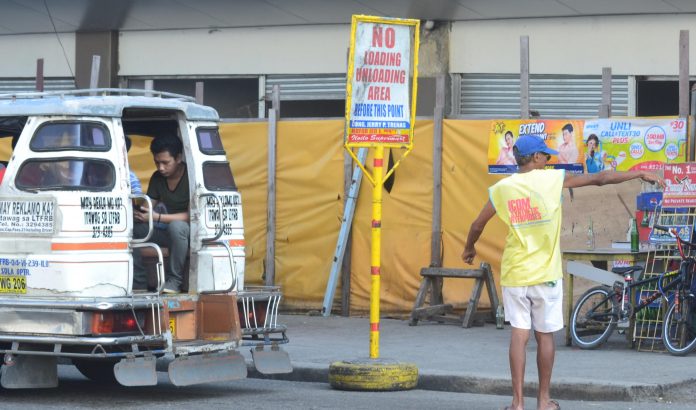
ILOILO City – The “barkers” are back and the city government will be rounding them up, too, just like what it did to mendicant Badjaos.
Regulation Ordinance No. 2014-194 outlaws barkers – individuals who “call for, facilitate, induce or convince commuters to board a particular or preferred public utility vehicle such as a jeepney, taxi, van, and bus for the purpose of extracting an amount from the vehicle’s driver.”
The Public Safety and Transport Management Office (PSTMO) will be reviving the campaign against barkers beginning Monday, Aug. 6.
According to PSTMO head Jeck Conlu, complaints reached his office about barkers harassing jeepney drivers who do not give them money.
He recalled a time during the administration of then mayor Jed Patrick Mabilog when the city government tried stopping barkers by giving them a livelihood assistance of P5,000 each.
Such approach apparently proved ineffective.
“It is time nga i-strictly implement naton ang anti-barker ordinance,” said Conlu who led last week’s rounding up of Badjaos and deporting them back to Mindanao.
Regulation Ordinance No. 2014-194 makes it unlawful for any person to loiter in public places, open parking spaces and designated loading and unloading areas, and intermittently perform and act as barker for public utility jeepneys, vans, taxis, and buses even with prior consent from the driver or any transport organization.
A violator could be jailed for a minimum of three months but not more than six months.
Barkers may be apprehended by the police or through citizen’s arrest at any time.
The ordinance, meanwhile, makes a clear distinction between barkers and legitimate “dispatchers.”
It defines dispatchers as persons authorized or accredited by transport groups to facilitate the boarding of commuters to public utility vehicles at transport terminals.
Section 4 of the ordinance stipulates that a transport group shall be allowed to employ dispatchers with proper identification cards and duly signed by the transport group’s president.
A dispatcher also manages and supervises the parking and sendoff of the public utility vehicle in an orderly fashion within the designated parking area but without collecting any fee from the driver.
Last week some 70 Badjaos who managed to sneak back to the city some seven months after they were driven away were again rounded up and deported to Mindanao.
“They told us it was chaotic from where they came from. Here they found peace and nobody’s bothering them,” said Conlu.
Conlu’s office was tasked to round up Badjao mendicants in coordination with the City Social Welfare and Development Office.
The Badjaos, widely known as “sea gypsies”, are an ethnic group scattered along the coastal areas of Tawi-Tawi, Sulu, Basilan and some coastal municipalities of Zamboanga del Sur in the Autonomous Region in Muslim Mindanao.
Because of the conflict between Muslim separatists and government troops and the lack of livelihood opportunities, many Badjaos left Mindanao, said Conlu.
On Nov. 10, 2017 Mayor Jose Espinosa III ordered the PSTMO to round up the roaming Badjaos and ship them back to Mindanao.
“Kun mangayo-ngayo sila nagapamilit pa kag nagapamutong, kalaw-ay gid (They force people to give them alms, it’s disgusting),” said Espinosa who admitted that regulating the entry of Badjao beggars to the city would be difficult.
Begging and giving alms to beggars are punishable under City Regulation Ordinance 2002-400./PN





